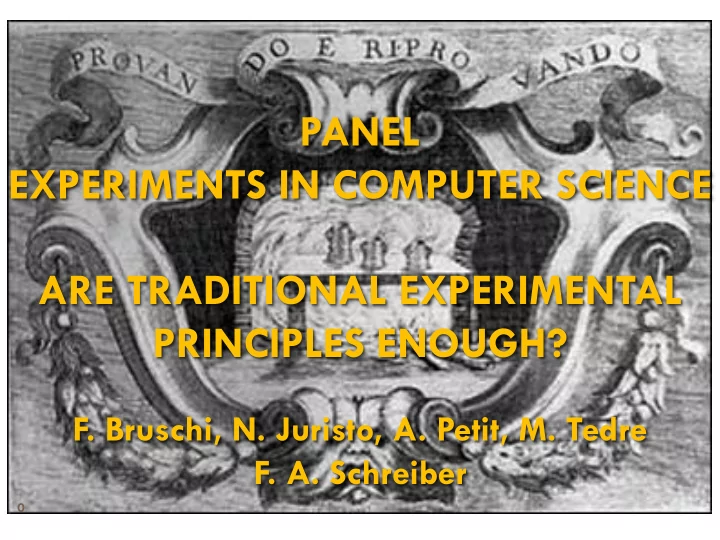

PANEL EXPERIMENTS IN COMPUTER SCIENCE ARE TRADITIONAL EXPERIMENTAL PRINCIPLES ENOUGH? F. Bruschi, N. Juristo, A. Petit, M. Tedre F. A. Schreiber 0
THE SCIENTIFIC METHOD 1 There remains simple experience; which, if taken as it comes, is called accident, if sought for, experiment. The true method of experience first lights the candle [hypothesis], and then by means of the candle shows the way [arranges and delimits the experiment]; commencing as it does with experience duly ordered and digested, not bungling or erratic, and from it deducing axioms [theories], and from established axioms again new experiments. Francis Bacon. Novum Organum. 1620 OBSERVATION HYPOTHESIS EXPERIMENT THEORY Observational studies EXPERIMENT/ CONJECTURE OBSERVATION THEORY SIMULATION Observational studies
PROPERTIES THAT CHARACTERIZE AN EXPERIMENT 2 GOALS Repeatability at different times and in different places to check the universality of results Reproducibility by other scientists to confirm that results are independent of the details of the specific experiments Comparison of the results of different instances of the same experiments DESIGN Adoption of a precise language to give rigor and precision to experimental data Use of precise measurement methods and tools to quantitatively describe the phenomena under investigation
OBSERVING BEFORE THE EXPERIMENT 3 To discover the unknown La chance ne sourit qu’aux esprits bien préparés. Louis Pasteur “what happens if I mix H 2 and O?” + + =
WHY EXPERIMENTS? 4 To test a hypothesis “I think the Earth is flat, am I right?” NO!
WHY EXPERIMENTS? 5 To determine the value of some physical variable “How much does one Ton of steel weigh?” = 1 ton “How fast is light in a vacuum?” = 300.000 Km/s
WHY EXPERIMENTS? 6 To compare a set of different «objects» to determine their relative merits (benchmarking) “I drive a Ferrari and you drive a 500; who is faster ?” ARRIVAL IVAL
INFORMATIC TOOLS AND SERVICES FOR SCIENTIFIC EXPERIMENTATION 7 Usage of simulation models and frameworks make experimentation cheaper and faster than in real-life Pervasive systems support sensing real-life physical data as input to application programs which compute experiments outputs
EXPERIMENTATION ON AND ABOUT INFORMATIC SYSTEMS THEMSELVES 8 Software testing/debugging is still (alas ) mostly an empirical activity Usage of Data mining for knowledge discovery Usage of simulation models and frameworks to predict system performance System benchmarking is common practice How do these activities compare to the classical notion of “ experiment ”? Do we need any new vision? Are CS/CE curricula suitable for giving our students an experimental awareness?
EXPERIMENT WITH JOY …! 9
Recommend
More recommend